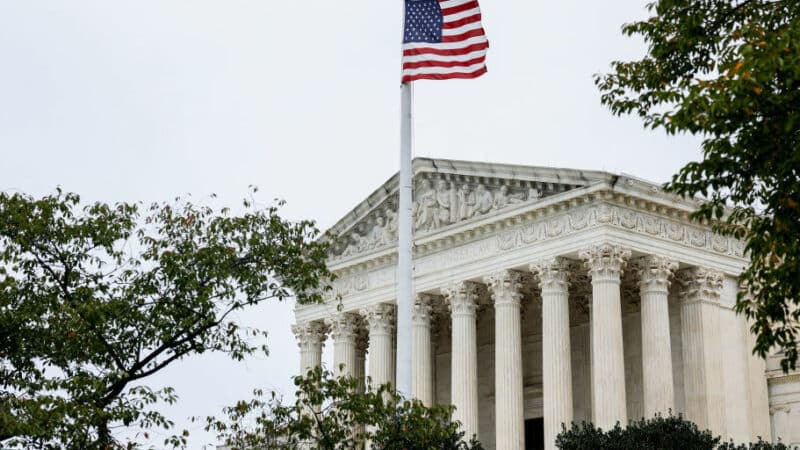The landmark Voting Rights Act faces further dismantling in case from Alabama
The U.S. Supreme Court hears arguments on Tuesday in a case that could put another nail in the coffin of the landmark Voting Rights Act, first passed in 1965 and aimed at eliminating race discrimination against minority voters.
Since 2013, the Supreme Court has twice struck down or neutered major portions of the act. Now, once again, the law is on the chopping block — this time on the question of how state legislatures may draw congressional district lines when the state’s voters are racially polarized.
At issue is Alabama’s congressional redistricting plan adopted by the Republican state legislature after the 2020 census. More than a quarter of the state’s population is African American, but in only 1 of 7 districts do minority voters have a realistic chance of electing the candidate of their choice. Black voters are either concentrated in that district so they are a supermajority there or spread out across the remaining six districts so that their voting power is diluted. It’s a practice known as packing and cracking.
“In Alabama, voting is racially polarized, which means Black voters and white voters systematically vote for different candidates, particularly when Black candidates are on the ballot,” says election law expert Richard Pildes. And that, he says, “triggers the Voting Rights Act.”
How the lower courts ruled
Triggering the Voting Rights Act is a big deal, with special irony in this context. That’s because this case involves a provision that Congress changed in 1982 to fix what it considered an erroneous Supreme Court interpretation of the statute.
After the Supreme Court ruled in 1980 that voting rights advocates had to prove intentional discrimination in order to invalidate an electoral system, Congress amended the law to make clear that minority voters only have to prove a discriminatory result — a considerably easier thing to do than proving intentional discrimination. Discriminatory result has been the standard since then, upheld by the Supreme Court and enforced by the lower courts.
In January, a three-judge federal court panel ruled unanimously that Alabama could and should have created two compact congressional districts with a majority, or close to a majority, of Black voters: two districts instead of just one. Two of the judges on the panel were Trump appointees, the third a Clinton appointee.
The state appealed to the Supreme Court, which by a 5-4 vote blocked the lower court ruling, which ordered a new map for the 2022 election, then nine months away. That was too much for Chief Justice John Roberts, a longtime critic of the Voting Rights Act, but who this time dissented along with the court’s three liberals. He said he could find “no apparent errors” in the way the lower court applied existing precedents.
Alabama’s argument
What he didn’t say was whether the court should revisit some of those precedents. And on Tuesday, the court hears arguments on whether to do just that. At issue is whether to overrule or modify those prior decisions that have governed the law for over 30 years. The existing precedents put an “affirmative obligation” in the face of racially polarized voting to “give minority voters an equal opportunity to elect the candidates they prefer,” says Pildes, a professor at the New York University School of Law.
He notes that Alabama’s arguments range from the narrow ones about how to interpret the 1982 amendments to the Voting Right Act, to more extreme arguments.
One extreme argument, Pildes says, is that the Voting Rights Act doesn’t apply at all to legislative redistricting plans, even though the court has historically applied the act to those plans. “Or,” he says, “even more dramatically, that if [the Voting Rights Act] does apply in the way the lower court held here, then the act is unconstitutional.”
Unconstitutional because it is based on affirmatively creating a second compact district based on race. As Alabama put it in its briefs, by requiring a “race-based” redistricting map, the lower court indulged in “the noxious idea that redistricting begins and ends with racial considerations.”
Countering that argument, Black voters contend that the state’s argument boils down to a topsy-turvy, inside-out proposition: that any effort to eradicate racial discrimination is unconstitutional because it has to emphasize considerations of race.
9(MDA2ODEyMDA3MDEyOTUxNTAzNTI4NWJlNw004))
A million veterans gave DNA for medical research. Now the data is in limbo
Retired service members donated genetic material to a DNA database to help answer health questions for all Americans. The Trump administration is dragging its heels on agreements to analyze the data.
4 astronauts splashdown on SpaceX capsule to end Axiom Space’s private Ax-4 mission
The private crew included Ax-4 mission commander and former NASA astronaut Peggy Whitson. It was her fifth trip to space and extended her record-setting duration to 695 days, the most of any American.
Heavy rains and flash flooding sweep across Northeast
Flash flood watches and warnings were in place in parts of New Jersey, New York, Pennsylvania and surrounding areas as downpours moved through the region.
Will Congress cut funds to NPR/PBS and foreign aid this week?
The Trump Administration has asked Congress to rescind funds for NPR/PBS and Foreign aid. Congress has until the end of the week to approve the cuts.
Power prices are expected to soar under new tax cut and spending law
In states without policies to drive renewable energy, power prices could surge as federal tax incentives for clean energy disappear, according to Energy Innovation, a think tank.
This family wants to have more babies, but not in a hospital
The Trump administration is encouraging people to have more children, with baby bonuses and tax breaks. But some families who are practicing pronatalism want alternatives to hospital births.








